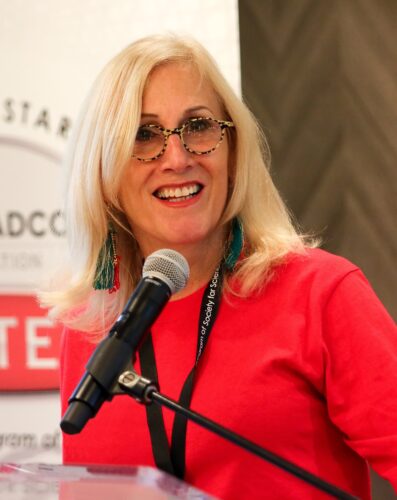Margaret Helen Harper was a programmer who worked with Grace Hopper to help develop one of the first computer programs. But until 2020, she didn’t have a Wikipedia biography. Thanks to a student editor currently in our program, she now does and hundreds of people have since read about her work.
With 450 million readers and 275,000 biographies of scientists, Wikipedia is an extraordinary avenue for recognizing the achievements and contributions of scientists. But women and people of color are underrepresented on the site. This lack of visibility contributes to and is reflective of systemic problems facing the STEM workforce: women and people of color often lack role models in their chosen careers and implicit bias reinforces stereotypes that they don’t belong. Women receive about half of all STEM degrees in the United States, but comprise only 30% of the STEM workforce. As compared to 11% of the overall workforce, Black Americans make up only 9% of STEM workers, while Latinos make up only 7% of STEM workers as compared to 16% overall. Young scientists need to see a greater diversity of successful STEM professionals as role models. And Wikipedia is a great place to show them.

“People find inspiration in those with whom they identify and share a sense of commonality and worldview,” says Paula Golden, the President of Broadcom Foundation. “Broadcom Foundation is excited to partner in the Wiki Education Project that will add biographies and contributions of STEM pioneers of color and gender diversity to Wikipedia, which will enable young people to find inspiration in scientists, engineers and innovators who look like them.”
Broadcom Foundation has generously provided a $150,000 grant to bring the hidden figures of notable people in STEM to light on Wikipedia. In 2022, Broadcom Foundation supported our Equity Outreach Coordinator, Andrés Vera, in recruiting more than thirty instructors from Historically Black Colleges and Universities (HBCUs), Hispanic-Serving Institutions (HSIs), and Tribal Colleges and Universities (TCUs). Broadcom Foundation’s current grant supports Wiki Education’s continued recruitment efforts of faculty and onboarding for students adding these new STEM biographies of women and people of color to Wikipedia for the first time. By the end of 2023, these students will add at least 35 new heroes and heroines to Wikipedia, inspiring young people searching for role models that look like them.
By connecting higher education classrooms to the publishing power of Wikipedia, Wiki Education will help future engineers, computer scientists, and others in STEM — including thousands of women and racially diverse university students — improve biographies on Wikipedia of STEM’s hidden figures and see that they belong in the STEM careers of their choosing.
What’s different about the support Wiki Education offers through this initiative?

As part of our typical Student Program support, all instructors receive:
- A modular online training to introduce students to Wikipedia policies and procedures;
- Handbooks offering advice and guidelines for students and professors; and
- Metrics about student edits, including amount of content added and page views of articles
But through this generous grant, we are able to offer additional support and a stipend for instructors joining us in this initiative, including:
- Assignment design support and help generating lists of articles for students to create;
- Phone, email, and video support during the term for professors and students, including regular check-ins to ensure the students are adding relevant biographies of people in technology; and
- Stipends for instructors who successfully complete the project
Does this sound like something you want to be a part of? Email andres@wikiedu.org.
